Wondering why you should really start building a culture of agent engagement?
94% of consumers say they’re more likely to make a purchase from a company that treats them well.
And support is your first line of interaction with customers when it comes to providing that remarkable customer experience.
But as customers still prefer talking to humans, your agent team naturally has to give their best.
To help you build better-engaged support teams, we’re taking a deep dive into understanding how industry leaders have implemented strategies to increase agent engagement and satisfaction.
Across seven lessons, we’ll share the different tactics you can use to inspire and motivate your own agents. We’ll also discuss how technology and several different best practices play a part in building long-term agent engagement initiatives.
What is agent engagement?
Agent engagement is a process that helps you ensure your agents are fully engaged in their job and in the company’s mission. It often includes activities like team building events or employee recognition and rewards programs.
Improving agent engagement in the contact center is closely tied to providing a better customer experience. That’s because agents who are engaged and motivated have stronger morale and provide a better support service. In fact, happy agents are three times more motivated to resolve customer issues.
So…
Why is agent engagement important?

Besides the immediate impact on customer experience, investing in agents’ engagement can pay dividends in terms of customer loyalty and company reputation, as well as boosting your ROI. Providing superior customer service means customers are more likely to have a positive experience, creating a ripple effect of increased repeat business and positive word of mouth.
Engaged agents also tend to be more productive. They’re less likely to take unnecessary breaks and require fewer handoffs, both improving ROI. Moreover, shorter call times and faster resolution times lead to lower call costs and greater cost savings.
All this means your agents will also contribute to promoting a better company reputation. After all, organizations with highly engaged workers get as much as 20% more [and higher] sales.
👉Read more on ways to scale your customer support efforts in our complete guide.
How to improve customer service agent engagement in 7 steps
There are probably a million things customer service leadership has tried to keep their teams engaged. But you don’t have to re-test everything.
We’ve talked to industry experts to get their tried-and-tested tips for improving agent engagement. Here are the core takeaways you can implement even if you don’t have a lot of resources or time:
Helping agents stay motivated
Daniel Prindii, Fractional Head of Community and People, says that in order to motivate your team for improving agent engagement in the contact center, it’s important to set clear expectations from the job description stage:
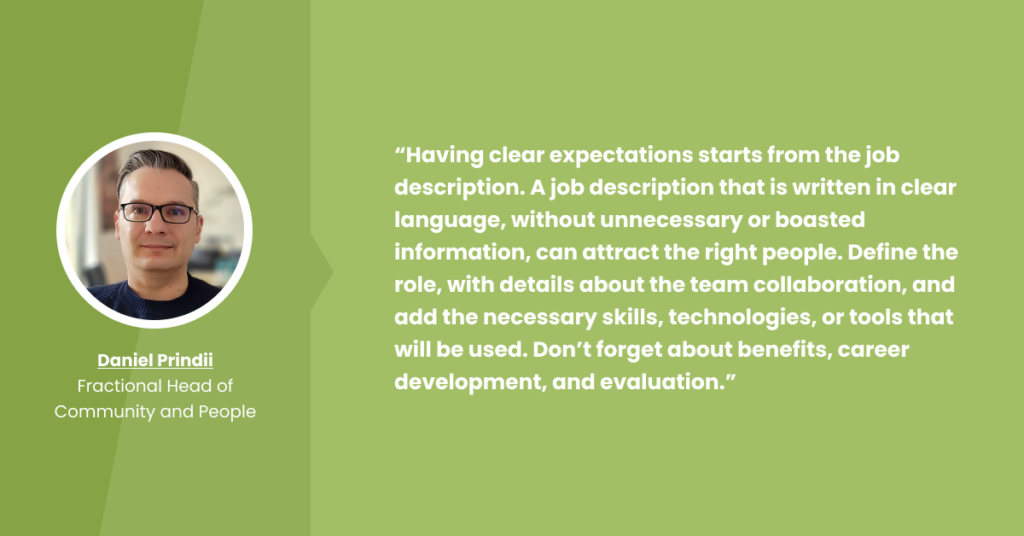
Another core pillar to keeping agents motivated that Daniel observes is constantly being in touch with your team. To do this, he suggests creating team rituals adapted to different needs:
“For example, you can set up a recurring chill chat, where everyone can share more personal ideas, weekend plans, or hobbies. This activity can help connect people besides their work interactions. Depending on your setup (in-office or remote) this can be transformed into an informal visit to a nearby coffee shop or park. If the team is remote, they can bring their favorite beverage to the online meeting.”
One effective method for establishing work routines or habits is by assigning Missions to your agents. This will help your team visualize their goals, get fun challenges, and keep things focused.

Providing a continuous feedback loop
Just like communication, feedback should be ongoing (and not just conducted during annual performance reviews). Waiting for too long results in agents developing bad habits or providing subpar service for months at a time before learning there is an issue.
Regular feedback (whether through informal coaching or formal evaluations) gives agents the opportunity to correct their mistakes and polish their skills immediately.
To ensure you’re maintaining a regular feedback loop, you can create Coaching Cards every time you want to communicate with an agent on their performance.
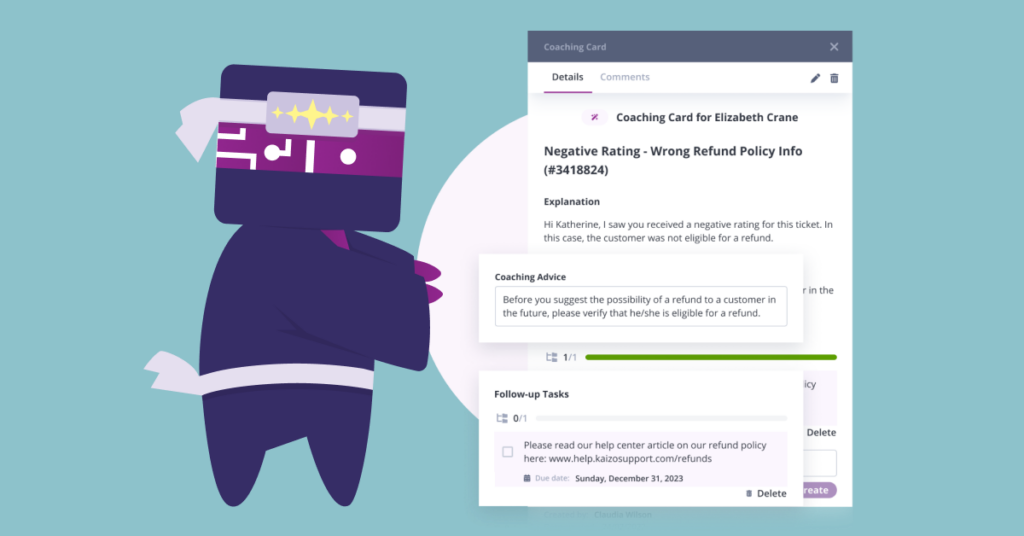
You can use these when:
- Your agents have lower performance results than usual
- The agent keeps making the same mistakes
- An agent manages to achieve good results on metrics they had previously struggled with
- You want to sum up a one-on-one meeting
TJ Treviño, HR Generalist, warns about the potential problems of thinking of feedback as a one-way process:
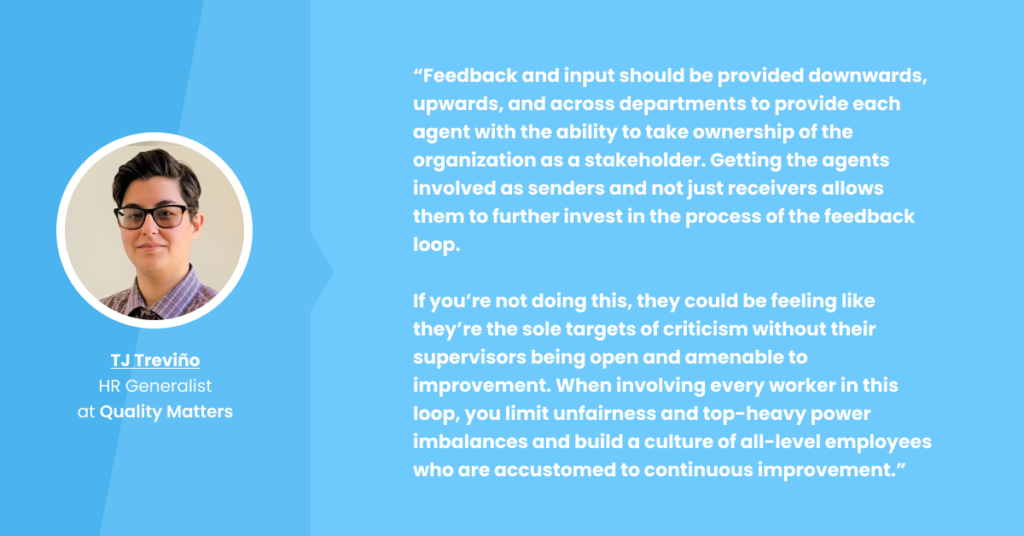
Investing in training and development
When agents have a strong, up-to-date foundation of knowledge about products, services, policies, and procedures, they can have more engaging, and effective interactions with customers. They will sound confident in their responses, address issues promptly, and provide helpful resolutions.
Besides this, Jodi Brandstetter, SPHR, SHRM-SCP, Founder and Lead Facilitator at Design Brainery, says that joining a company as an agent can provide an opportunity for individuals to learn about the company, its products and services, and the customer base. All this, as long as companies provide ongoing training and development to keep agents motivated and build their skills for future roles:
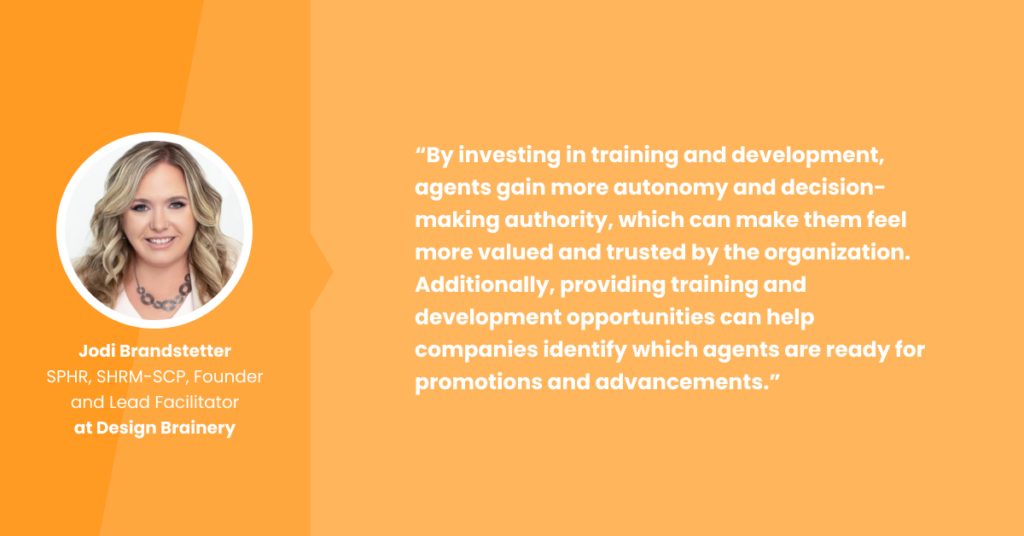
Daniel Prindii also highlighted the importance of building trust. He recommends having a knowledge base with all scenarios and solutions that will be the perfect guide when you onboard agents:
“Everyone wants feedback. It validates the employees’ efforts and helps them in their professional development. When an employee feels safe to speak up, to ask questions, it reduces the chances of hiding problems or lying. Every question, discussion, or scenario solved can be added to the internal knowledge base and help every team member become better at his job.”
Maintaining transparency on agent performance
By providing clear feedback and metrics on agent performance, you empower your agents to improve and better assist customers.
You can do this by:
- Sharing key performance indicators like customer satisfaction scores, handle times, resolution rates, and more with your agents regularly
- Discussing trends you notice and opportunities for improvement
- Asking for their input on ways to enhance processes or provide additional resources
Agents can also see their own results and always know whether the feedback they are getting is based on actual performance data. With Kaizo, you can track over 50 metrics, spot patterns, and potential challenges ahead of time, and provide feedback on their performance.
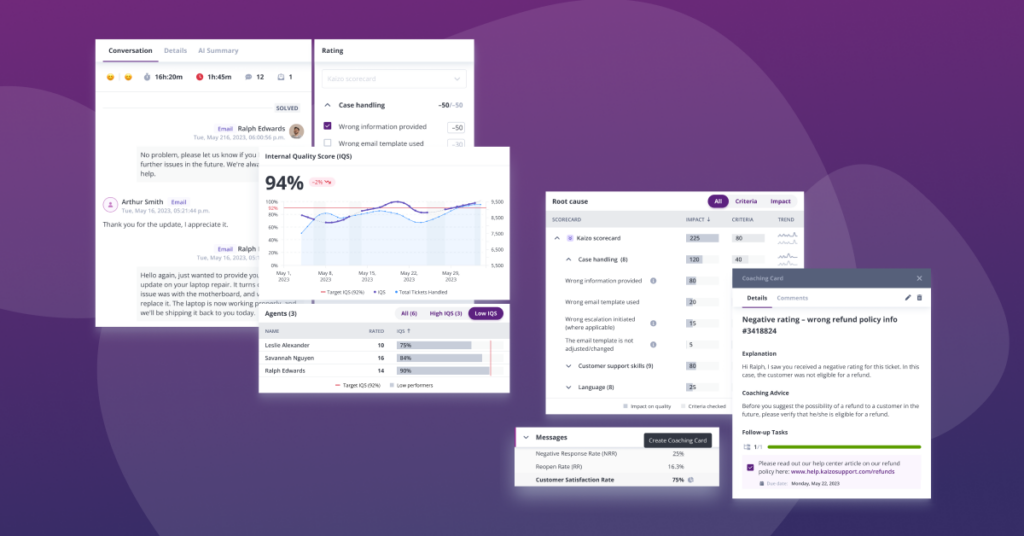
Understanding the importance of letting your agents stay autonomous
How about giving your customer support agents more autonomy?
Sit down and talk to them to understand just what this flexibility looks like in their own terms. Generally, when agents feel empowered to think on their feet, resolve issues creatively, and go the extra mile for customers, they will do a far better job. On the other hand, micromanaging agents or forcing them to follow strict policies will only create more frustration.
Magdalena Primo, Customer Support Supervisor at ID90 Travel, had previously felt mandated to stick to the script in one of her past support roles. She says this further took a toll on her as she felt she wasn’t authentic with customers:
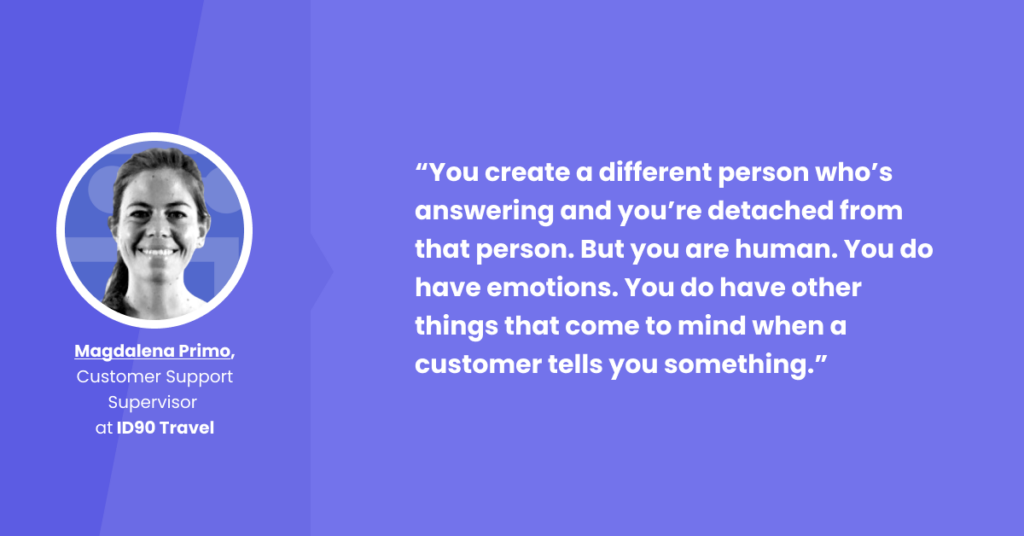
Autonomous agents can build stronger customer connections and gain loyalty through personal experiences. They’re better (and more creative) at getting to know customers’ preferences, past issues, and how to best fix problems quickly.
Sure, mistakes and exceptions will happen, but when you fully trust your agents to make good judgment calls, issues will be minimal. In fact, even when unexpected challenges appear, your agents will only have a lot to learn from them.
Keeping things fun
Gamification is one tactic that can be highly effective for boosting call center agent engagement and productivity.
Set up challenges, competitions, and leaderboards that encourage friendly rivalry and a spirit of collaboration. For example, award points or badges for things like handling difficult customer issues, providing exceptional service, or bringing on new team members.
Agents will love leveling up their profiles and progressing toward new milestones. Let agents vote on new challenges or the rewards for meeting them. This will give them a role in shaping the program and its success.
You can keep things fun by adding an element of humor and surprise so your agents will always look forward to the next challenge you have for them. For example, you can send them regular clues leading up to a special gift card or other types of rewards.
On the value of gamification, Dominik Blattner, CEO at Kaizo, notes that:
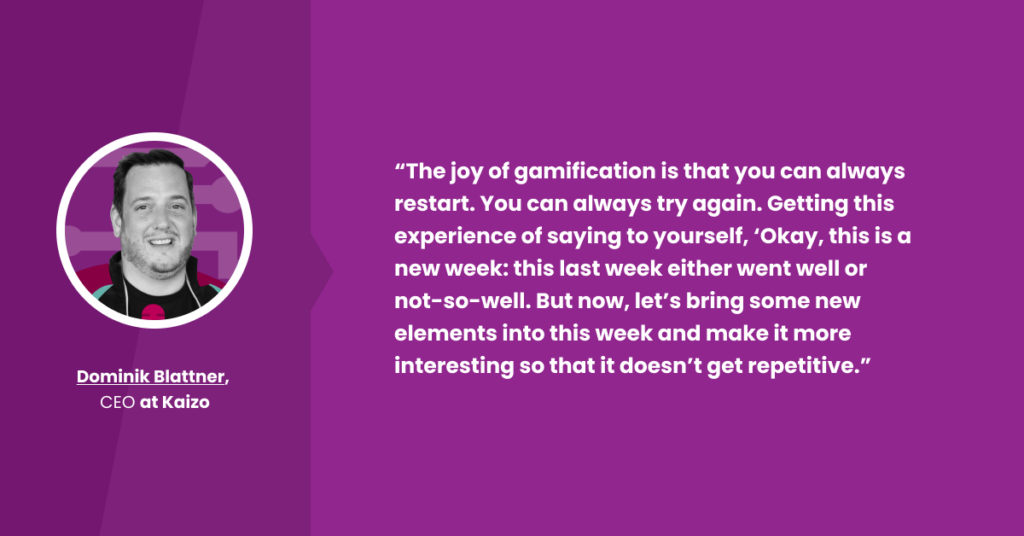
Rewarding agents
It can be very tempting to simply offer a monetary bonus scheme to your customer support agents. Generally speaking, such incentives work wonders for motivating agents to successfully complete repetitive tasks. But what matters most is if this bonus is attainable. Agents will simply not be motivated if they can’t see themselves achieving what you’re expecting of them.
Jan Brenneke, Chief Supply Officer at Talixo, recommends setting up incentives schemes with the right metrics tied to them:
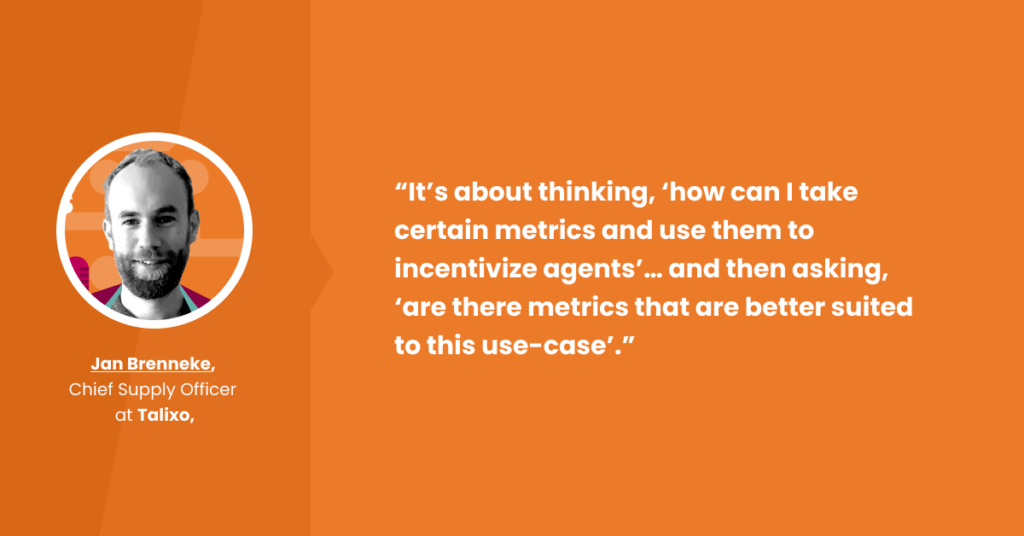
Each agent should feel like they know exactly what they work on and how they can better themselves to reach those goals you’ve set for them. If you’re constantly cluttering their backlog with tasks that will never end (hence never allowing them to reach those goals), you’re using incentives poorly.
Where to start with call center agent engagement
A healthy agent team is generally keeping all of the above things in mind. But if you don’t have the time or resources to implement all lessons straight away, focus on your immediate challenges.
For instance, if your agents are lacking motivation, think of actionable goals you can set for them and how you can incentivize your agents to reach them.
Book a Kaizo demo to see how you can successfully keep your agents engaged, analyze their performance, coach them, and save time on it all. All in a gamified fashion!



